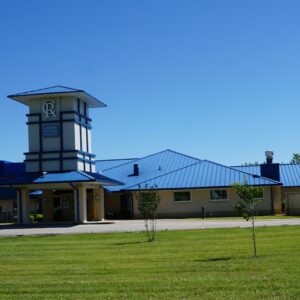We will work with you to develop a custom
treatment plan built around your individual
needs.
The Inpatient Rehabilitation Center, commonly known as the Blue Roof, is a 20-bed facility with the goal of assisting patients and their families with the transition from an acute hospital setting to home.
When patients are referred to us, they are considered by their physicians to be medically stable and physically able to begin a comprehensive rehabilitation program.
The inpatient therapy team at Cookeville Regional works with patients to create and carry out the best course of treatment for conditions that limit the ability to move, play sports or perform daily activities.
Our skilled team of therapists help prevent further injury, reduce pain, and maximize physical functioning.
All therapy programs are customized to meet the individual’s needs, as tolerance to therapy amounts varies.
Inpatient Rehab is open 7:30 a.m. to 9 p.m. We welcome visitors to come during our open hours. An Inpatient Rehab visiting tip is to visit after 3 p.m. as most patients are in therapy throughout the day until 3 p.m.




